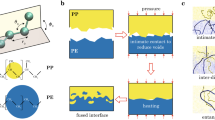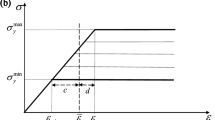Abstract
THE new technique of thermovision has been used to study deformation and fracture processes in polymers1,2. This technique provides a thermal image of the polymer surface, taken by means of natural infrared radiation in the wavelength range 2 to 6 µm. The method also allows an estimate to be made of the surface temperature of a polymer, although the value obtained may sometimes be low because of transparency in the polymer films.
This is a preview of subscription content, access via your institution
Access options
Subscribe to this journal
Receive 51 print issues and online access
$199.00 per year
only $3.90 per issue
Buy this article
- Purchase on Springer Link
- Instant access to full article PDF
Prices may be subject to local taxes which are calculated during checkout
Similar content being viewed by others
References
Cross, A., and Haward, R. N., J. Polym. Sci. (Phys.), 11, 2423 (1973).
Roseen, R., J. Mat. Sci., 9, 929 (1974).
Author information
Authors and Affiliations
Rights and permissions
About this article
Cite this article
CROSS, A., HALL, M. & HAWARD, R. Thermal effects in the necking of thermoplastics. Nature 253, 340–341 (1975). https://doi.org/10.1038/253340a0
Received:
Revised:
Issue Date:
DOI: https://doi.org/10.1038/253340a0
This article is cited by
-
Thermal analysis of the necking phenomenon in fiber drawing
Journal of Thermal Analysis and Calorimetry (2015)
Comments
By submitting a comment you agree to abide by our Terms and Community Guidelines. If you find something abusive or that does not comply with our terms or guidelines please flag it as inappropriate.



